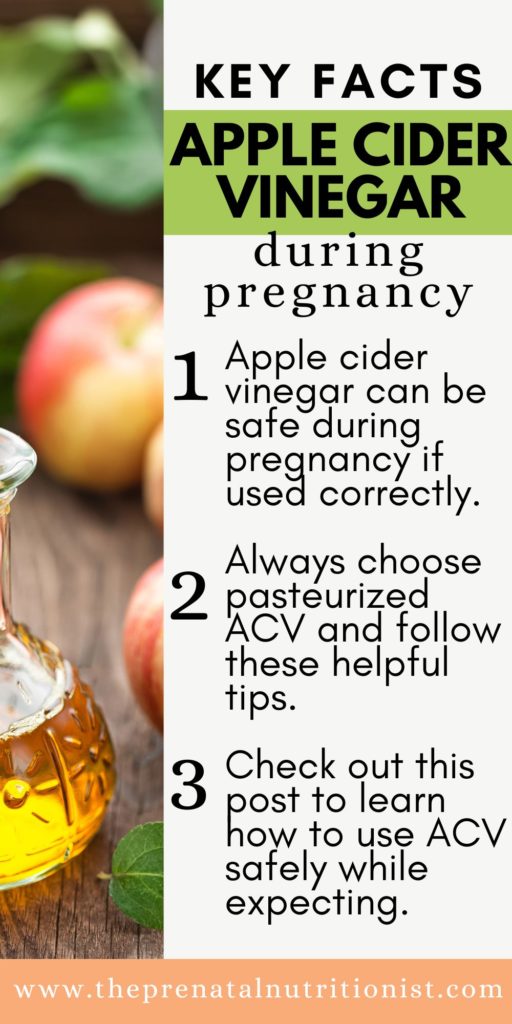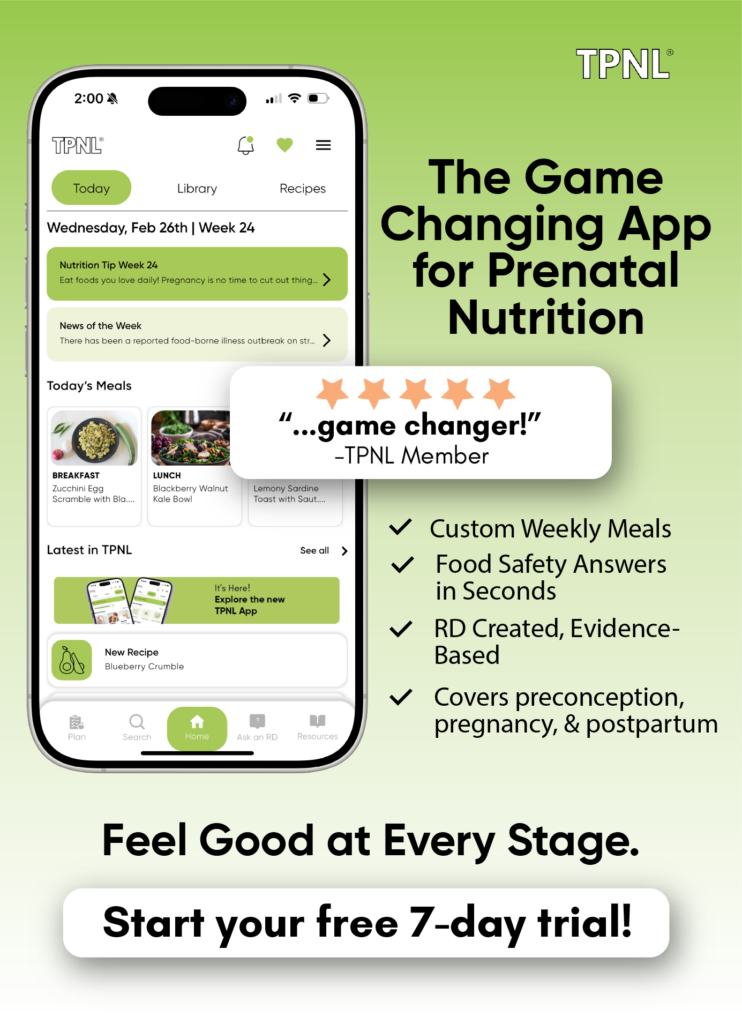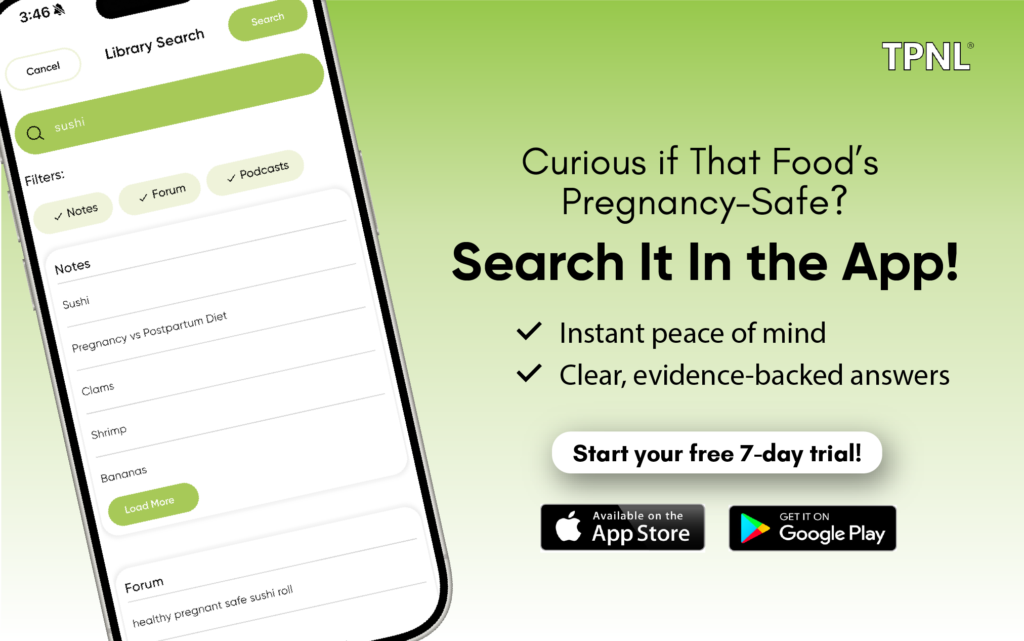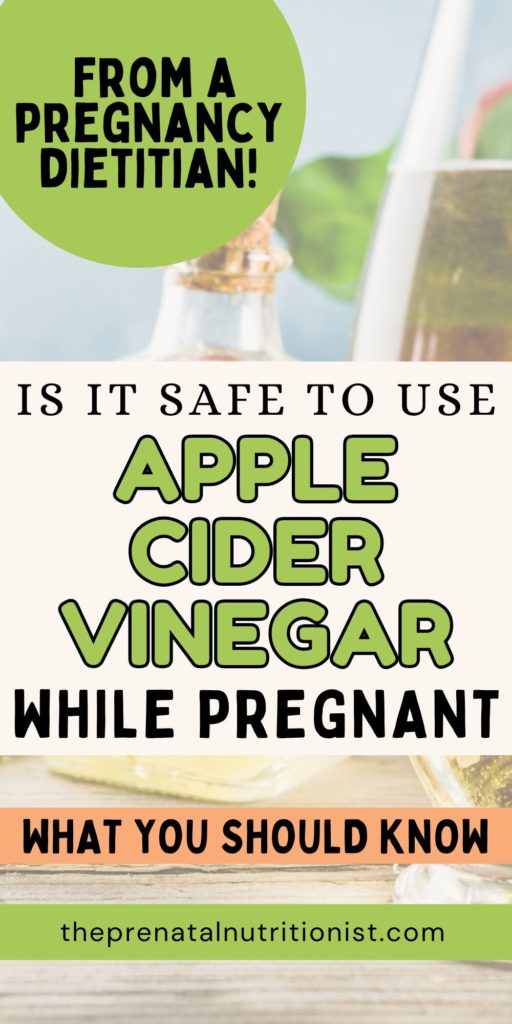
Pregnancy is an incredible journey. But let’s be honest, it also comes with its fair share of physical changes and discomforts. From morning sickness and constipation to heartburn and fatigue, it’s no surprise that many expectant mothers turn to natural remedies to find some relief.
However, not all “natural” options are proven safe for pregnant women. That’s why it’s truly important to know what’s actually evidence-based before adding something new to your routine.
Today’s post breaks down one of the most talked-about remedies: the infamous apple cider vinegar during pregnancy. Specifically, is it safe?
We’ll take a closer look at what it actually is, what experts say about its use during pregnancy, and how to use it safely.
By the end of this post, you’ll have a clear understanding of the potential health benefits and precautions. You’ll also walk away with simple, practical ways to use it safely (if you choose to) while you’re expecting.
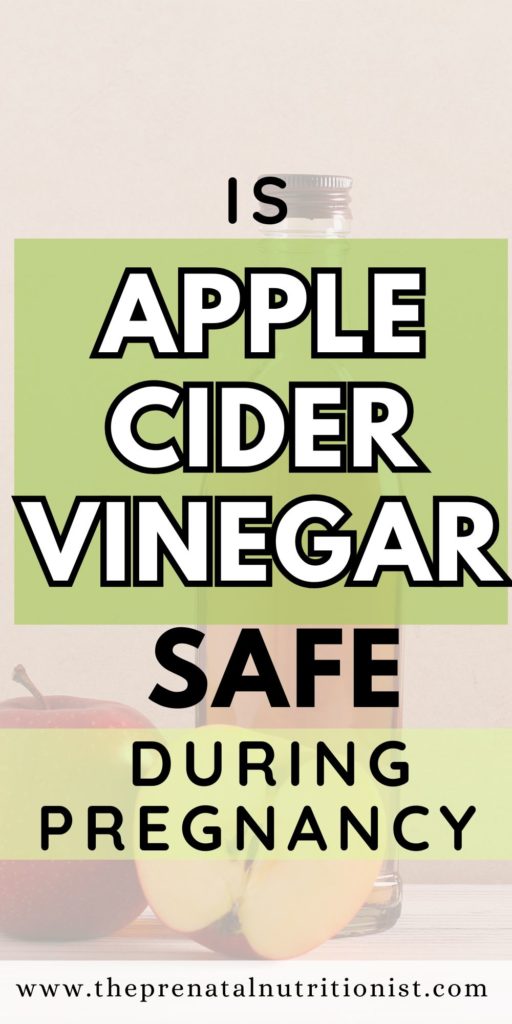
Is Apple Cider Vinegar Safe During Pregnancy?
Before we dive into the details, let’s set the stage. Apple cider vinegar (ACV) has been used for centuries as a natural remedy to aid digestion, balance blood sugar levels, and even support the immune system.
But when you’re pregnant, what you use and how you use it matters a little more, especially when it comes to supplements and home remedies.
In this post, we’ll cover:
- What apple cider vinegar is and where it comes from
- Whether apple cider vinegar is actually safe for pregnant women
- How to drink apple cider vinegar safely when expecting
- The potential benefits of ACV during pregnancy
Once you’re done here, make sure also to check out some of my other posts about pregnancy-safe foods and supplements. “Can You Eat Salmon While Pregnant?” and “Ashwagandha and Pregnancy” are two of the most common topics I get asked about.
They’re both great reads to help you feel more confident about what’s safe (and what’s not) during pregnancy.
What Is Apple Cider Vinegar?
Apple cider vinegar is a type of vinegar made from fermented apple juice. It starts with crushed apples mixed with yeast, which ferments the natural sugars into alcohol.
Then, acetic acid–producing bacteria are added to convert the alcohol into acetic acid. Acetic acid is the compound that gives ACV its tangy flavor and its main functional properties.
Apple cider vinegar comes in two main forms: pasteurized ACV, which has been heat-treated to kill potentially harmful bacteria, and unpasteurized ACV, which retains the “mother” and live cultures.
Unpasteurized ACV is safe for the general population, but because it isn’t heat-treated, it carries a slightly higher risk of contamination with pathogens such as Listeria or E. coli. These risks are very low but not zero.
During pregnancy, it’s generally recommended to choose pasteurized ACV for food safety purposes or to use unpasteurized ACV in recipes that will be heated.
We’ll discuss this more below.
Is Apple Cider Vinegar Safe For Pregnant Women?
Like most topics, there is much nuance to discuss, and what you choose to do is ultimately up to your comfort level.
Experts generally agree that pasteurized apple cider vinegar is considered safe for pregnant women when consumed in moderate amounts. However, unpasteurized apple cider vinegar isn’t recommended during pregnancy unless you will use it in cooked, heated recipes. Because it hasn’t been heat-treated, it’s more likely to contain harmful bacteria, such as Listeria monocytogenes.
Unpasteurized ACV doesn’t automatically contain harmful bacteria or make you sick, but it does carry a slightly higher risk than pasteurized options. If you see apple cider vinegar listed as an ingredient on a product on the shelf (not refrigerated), it has been pasteurized and is safe to consume.
The bottom line:
- Avoid excessive or undiluted use — it can irritate your stomach, esophagus, and tooth enamel.
- Choose pasteurized apple cider vinegar to reduce food safety concerns if you use it regularly in raw, unheated recipes.
- Always dilute ACV before drinking it or using it in dressings, marinades, or mixed beverages.
When used safely, apple cider vinegar may offer supportive benefits, such as aiding digestion, supporting blood sugar balance, and contributing to overall wellness during pregnancy.
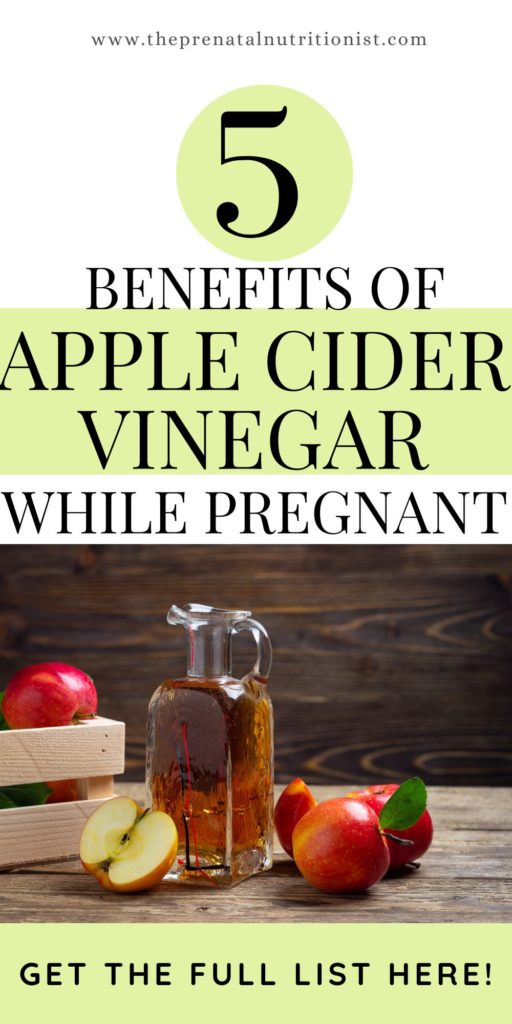
What Are The Benefits Of Apple Cider Vinegar During Pregnancy?
May Support Digestion
Due to hormonal changes, many pregnant women experience slower digestion and acid reflux. A small amount of diluted apple cider vinegar may support digestion by increasing stomach acidity, which can help those with naturally low stomach acid break down food more comfortably.
However, ACV isn’t a universal fix. There’s little research on its digestive benefits in pregnancy, and for many people, especially those prone to reflux, the acidity can make symptoms worse. Start small and see how your body responds.
If you’re dealing with reflux, check out my post: “Foods to Reduce Heartburn During Pregnancy.”
May Help with Morning Sickness
Some women find that sipping a teaspoon of apple cider vinegar diluted in water helps ease mild morning sickness. This is mostly anecdotal. There’s no strong research showing ACV reduces morning sickness, but the tangy flavor can be soothing for some. If it works for you, great; if not, skip it
Adds Flavor Without Added Sugar
One practical perk of apple cider vinegar is that it adds a bright, tangy flavor to foods without adding sugar or extra calories. Using ACV in things like homemade salad dressings, marinades, or sauces can help you build more balanced, blood-sugar-friendly meals during pregnancy. It’s an easy way to boost flavor while keeping ingredients simple and nutritious.
Supports Healthy Blood Sugar Levels
Studies suggest that acetic acid, the main active component in ACV, may help reduce post-meal blood sugar spikes by slowing the digestion of carbohydrates. This can be helpful for general blood sugar management, but research in pregnancy specifically is limited. ACV is not a treatment for gestational diabetes, but in small, diluted amounts, it may play a modest supportive role alongside a balanced diet.
Supports Immune System Health
ACV has natural antimicrobial properties, helping inhibit the growth of certain bacteria in food and on surfaces. However, there’s no strong evidence that drinking ACV directly boosts the immune system. If anything, using small amounts in dressings, marinades, or diluted drinks may offer very mild support, but it’s not a substitute for nutrient-rich foods, adequate sleep, or hygiene.
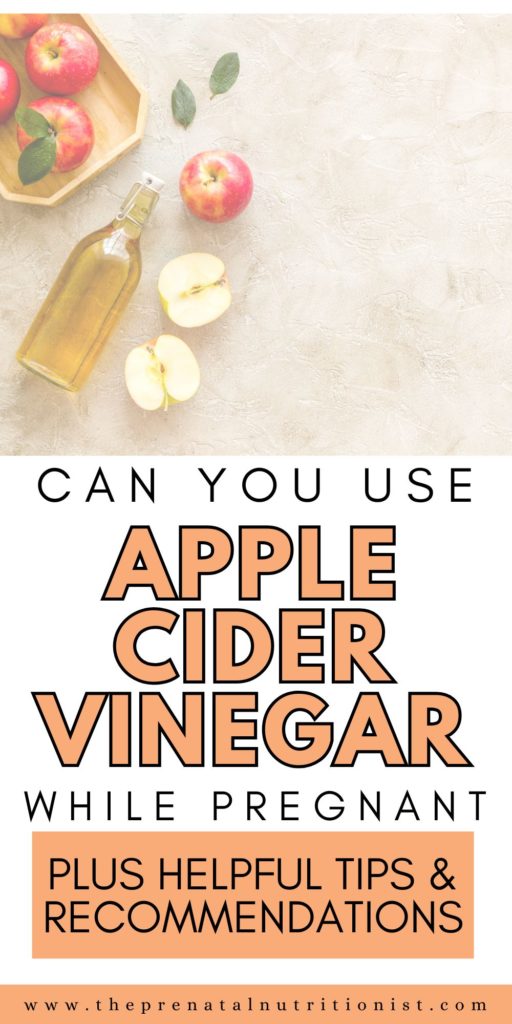
How To Drink Apple Cider Vinegar During Pregnancy
Limit your intake to small amounts daily.
When it comes to drinking apple cider vinegar during pregnancy, a little goes a long way. Stick to small amounts, about 1–2 teaspoons diluted per day, unless your doctor gives you different guidance.
Use it in a salad dressing or for cooking.
If you’re not a fan of drinking ACV, try adding it to salad dressings, marinades, soups, or sauces. You still get the tangy flavor and potential benefits without the strong aftertaste, and it’s often easier on your stomach this way.
Limit or avoid unpasteurized apple cider vinegar.
Even though it might seem more “natural,” unpasteurized ACV can carry a slightly increased risk of harmful bacteria since it hasn’t been heat-treated. During pregnancy, it’s safer to choose a pasteurized ACV option or use your unpasteurized ACV in a cooked dish.
Choose pasteurized apple cider vinegar.
Pasteurized ACV has been heat-treated to eliminate harmful bacteria, making it the recommended choice during pregnancy. Always check the label to make sure it says pasteurized.
Dilute it in a glass of drinking water.
Never drink apple cider vinegar straight. Its acidity can erode tooth enamel and irritate your throat or stomach. Mix 1 tsp of ACV into a full glass of water and sip it slowly, or incorporate it into meals instead. Or mix into tea!
Learn more about prenatal nutrition with The Prenatal Nutrition Library App!
In short, yes! Apple cider vinegar can be safe during pregnancy.
The best practice is to stick with pasteurized apple cider vinegar, always dilute it in water, and consume it in moderate amounts.
Every pregnancy is unique, and what works for one person may not work for another. Always check with your healthcare provider before adding new remedies or supplements to your routine.
You can look up the safety of any food, beverage, or ingredient in The Prenatal Nutrition Library app. This is my dietitian-designed app that takes the guesswork out of eating for preconception, pregnancy, and postpartum.
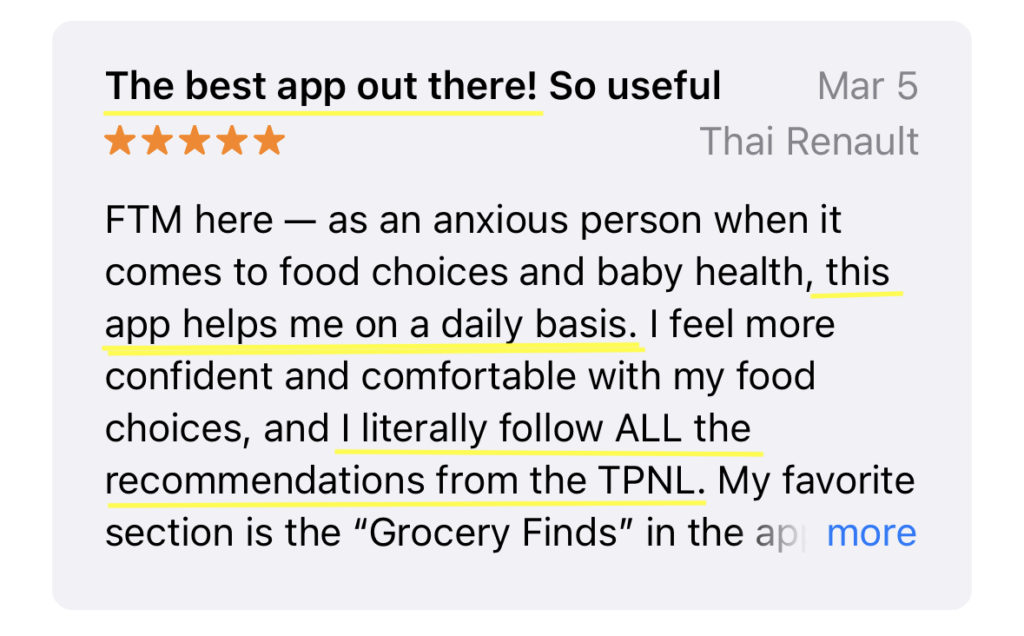
Enjoy a free 7-day trial when you sign up for The Prenatal Nutrition Library app here–no strings attached!
Get a personalized weekly meal plan, research-backed learning hubs for every stage, and 600+ dietitian-approved recipes when you’re unsure about what to eat.
Don’t overthink it, let us do the research and planning for you!
